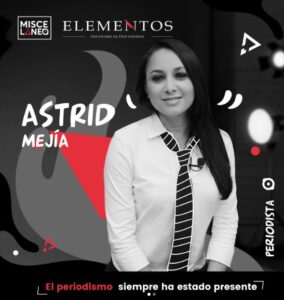Showing the most human face of journalists and connecting their personal stories with those of their audiences is one of the challenges of a new podcast from El Salvador’s Revista Elementos.
Under the title Misceláneo, the team from the magazine that specializes in in-depth journalism published the first season of a podcast that narrates the journeys of four Salvadoran journalists.
“In recent years, under the current government, we have received many attacks from the ruling party that makes us see [journalists] as negative people. In fact, they have put us in the same basket as the members of the opposition and made us see ourselves as their enemies. Always maintaining the discourse of the good and the bad,” Maite Portillo, multimedia coordinator of Revista Elementos, told LatAm Journalism Review (LJR).
According to Portillo, one of the motivations for creating this podcast is to counteract the attacks on the Salvadoran press and for “the audience to see that beyond the character who investigates, beyond the character who does the reporting, there is a person who has a history of life and who suffers the consequences of wanting to do the right thing.”
The Association of Journalists of El Salvador has denounced that under the current government of President Nayib Bukele, the journalistic profession has been criminalized in that country.
In addition, according to data from the association, in 2022 it recorded a total of 147 violations and 161 attacks on journalists. Not to mention reports that the phones of 35 communicators and members of civil society were infected with Pegasus spyware between July 2020 and November 2021.
Revista Elementos was founded at the end of 2021 by journalists Luis Canizales and David Ernesto Pérez and the idea behind creating it, as Portillo explained, is to reveal and explain, through their journalistic investigations, what is happening in El Salvador.

Maite Portillo, multimedia coordinator of Revista Elementos, said that one of the motivations for creating the Misceláneo podcast is to counteract the attacks suffered by the Salvadoran press. (Photo: Elementos Magazine).
To carry out the podcast they had the support of the digital activism platform Inspiratorio (an initiative of the non-profit entity Puentes based in Colombia and Spain) which, through the second edition of the virtual camp for journalists, gave Revista Elementos financing and support in the conceptualization, development and dissemination of the podcast.
Paloma Martínez, co-coordinator of Intrasentido [allied organization in Mexico of Inspiratorio.org], told LJR that they designed the virtual camp with the purpose of promoting the experimentation of narratives and collaboration with journalists from various places in Latin America.
“This year the camp was held from Sept. 12 to 28, 2023 and journalists from Mexico, Ecuador, Argentina and El Salvador participated. The idea is to have five weeks of training, to five organizations, who are given a scholarship of $5,000 to carry out their work. We are already preparing next year's virtual camp and the call will be published on the Inspiratorio page.”
Inspiratorio on its website said that through “the collective creation of alternative, diverse and hopeful narratives, we can challenge the dominant interests that have established narratives about the world, perpetuating and normalizing injustice, oppression and inequality. In community, it is possible to rewrite this history.”
Despite having more than 10 years working as a journalist in El Salvador, this is the first time that Astrid Mejía dares to tell her personal story.
In the podcast, she takes a journey from her childhood in the rural area of Chalatenango, in the north of El Salvador, to becoming a prominent journalist specializing in soccer and overcoming the challenges that women face in sports journalism.
“What I do blame the career for is that it greatly mutilated what I felt as a sports fan, specifically soccer. That is to say, going to the field as a spectator and then going to the field as journalists are totally different experiences. And if I choose one or the other, I'll choose the first," Mejía said in the episode titled "Astrid Mejía, soccer, journalism and the gender struggle in El Salvador."

"Astrid Mejía, soccer, journalism and the gender struggle in El Salvador" is one of the episodes of the first season of the Misceláneo Podcast (Image: Revista Elementos).
Mejía told LJR that despite not being used to being the protagonist of stories, she felt very comfortable with the interview and the questions they asked her.
“It is necessary to show this other facet because we run a lot with this idea that the journalist is skeptical, that nothing permeates the journalist. It's like removing that way of thinking a little and showing this part of ourselves and saying that you are a normal person like any other, with a story," Mejía told LJR. “Other people can also see themselves reflected in your story and hear everything it cost you to achieve certain things.”
Mejía is not the only Salvadoran journalist who dared to participate in the podcast. The first season of Misceláneo also featured the testimonies of Carlos Hernández Cruz, a journalist who is part of the LGBTIQ+ community; Mónica Rodríguez, former television journalist; and feminist journalist Metzi Marte.
It took the creators of the Misceláneo podcast about two months to shape the four stories presented in the first season. In addition, they want to make a second season.
However, they are currently focused on promoting the first season and hope to hold talks with non-governmental organizations early next year to publicize the published stories.
“We want to change that hate speech against journalists, that speech that says that journalists are liars and sellouts, for a speech that is more attached to reality,” Portillo said.
Misceláneo was released in November and is available on Spotify.